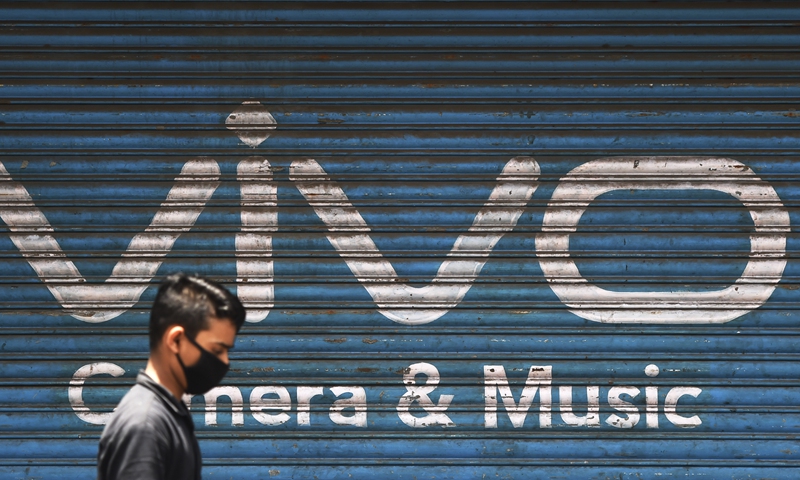India's checks on re-routed imports to have little impact: expert
By Chu Daye Source: Global Times Published: 2020/8/4 18:48:40

A man walks past an advertisement of Chinese mobile phone maker VIVO, in Mumbai on June 22. Photo:AFP
China should watch how far India can go in its reported intention to increase the barriers on imports from Southeast Asian countries to restrict Chinese goods entering the country via re-routing, Chinese experts said Tuesday.
The move, which is one of India's latest economic offensives and is to be implemented by mandatory stringent disclosure norms and more frequent checks at ports of entry for goods from many Asian countries, aims to hit Chinese exports to the country amid a wave of "Boycott China" sentiment.
Indian media has reported that the Indian government has been planning to raise quality standards for imports, and the country has banned nearly 300 Chinese-developed mobile phone apps and tightened investment from China after a border clash in June.
Chinese experts said Tuesday that it is unclear at this stage how India is going to effectively implement this rule but it is clear that New Delhi badly wants to hurt China economically, although its economic offensive will be negligible given that India only accounts for 3 percent of China's total exports.
"India is apparently trying to pressure China, and I believe China should just wait and see how things go as the pressure is negligible," said Zhao Gancheng, director of the Center for Asia-Pacific Studies at the Shanghai Institute for International Studies.
"Indians are not buying Chinese products because they like China. It is because Chinese products best suit their needs," Zhao told the Global Times Tuesday.
Wang Shiye, a research fellow with the Chinese Academy of International Trade and Economic Cooperation, said transshipment via Southeast Asia is relatively easy to spot but products assembled in Southeast Asian countries are quite difficult to identify and a total ban on Chinese goods entering India via Southeast Asia is practically impossible.
Reuters reported the Indian authority is keeping an eye on products including base metals, electronic components for laptops and mobile phones, furniture, leather goods, toys, rubber, textiles, air conditioners and televisions.
There is no data currently on the quantity of finished products that actually went from China to India via re-routing and how much went in the form of ASEAN-assembled products with parts made in China.
An executive at an industrial park based outside Bangkok, Thailand told the Global Times that sales from his park to India is actually very small.
Attracted by ASEAN's lower production costs, many Chinese companies have set up factories in Vietnam and Cambodia and Indian importers have been directly ordering products from them, which attract lower transport costs and tariffs, a manager at a light manufacturing company told the Global Times.
A Chinese businessman in Vietnam told the Global Times on Tuesday that heavy fines are imposed on those who re-route goods so most companies in the country no longer engage in such trade.
Zhao said that pushing imports checks to the extreme will harm the interests of members of ASEAN and predicted that India will not push this approach too hard out of fear of resentment and retaliation from those countries, whose relationship India sees as vital.
Chinese netizens are unfazed by India's potential new action.
"India cannot win militarily at the disputed border region, so it decided to pursue economic suicide to scare China," one commenter wrote on news site guancha.cn.
Posted in: ECONOMY